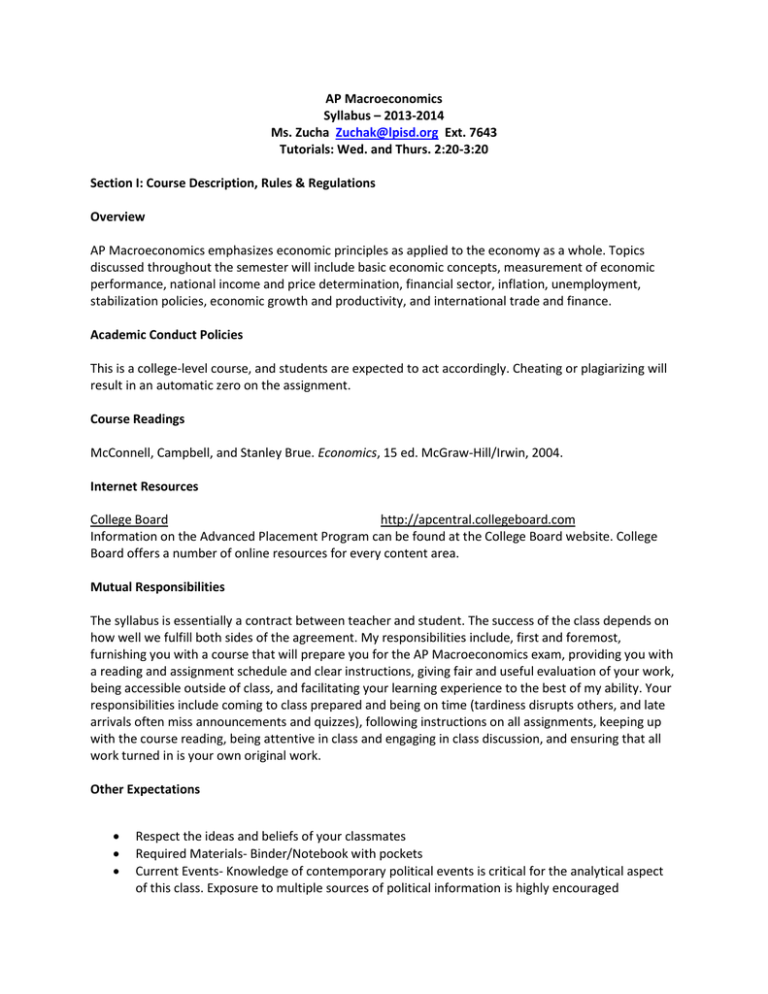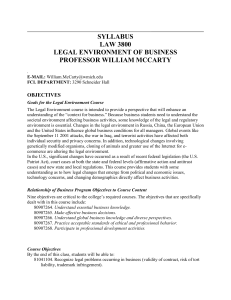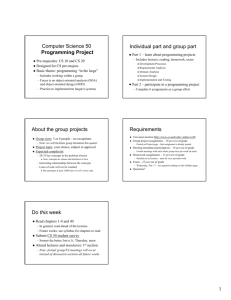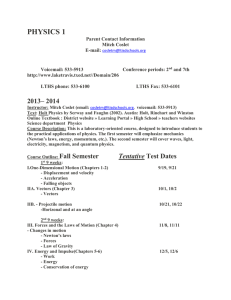AP Macroeconomics Syllabus – 2013
advertisement

AP Macroeconomics Syllabus – 2013-2014 Ms. Zucha Zuchak@lpisd.org Ext. 7643 Tutorials: Wed. and Thurs. 2:20-3:20 Section I: Course Description, Rules & Regulations Overview AP Macroeconomics emphasizes economic principles as applied to the economy as a whole. Topics discussed throughout the semester will include basic economic concepts, measurement of economic performance, national income and price determination, financial sector, inflation, unemployment, stabilization policies, economic growth and productivity, and international trade and finance. Academic Conduct Policies This is a college-level course, and students are expected to act accordingly. Cheating or plagiarizing will result in an automatic zero on the assignment. Course Readings McConnell, Campbell, and Stanley Brue. Economics, 15 ed. McGraw-Hill/Irwin, 2004. Internet Resources College Board http://apcentral.collegeboard.com Information on the Advanced Placement Program can be found at the College Board website. College Board offers a number of online resources for every content area. Mutual Responsibilities The syllabus is essentially a contract between teacher and student. The success of the class depends on how well we fulfill both sides of the agreement. My responsibilities include, first and foremost, furnishing you with a course that will prepare you for the AP Macroeconomics exam, providing you with a reading and assignment schedule and clear instructions, giving fair and useful evaluation of your work, being accessible outside of class, and facilitating your learning experience to the best of my ability. Your responsibilities include coming to class prepared and being on time (tardiness disrupts others, and late arrivals often miss announcements and quizzes), following instructions on all assignments, keeping up with the course reading, being attentive in class and engaging in class discussion, and ensuring that all work turned in is your own original work. Other Expectations Respect the ideas and beliefs of your classmates Required Materials- Binder/Notebook with pockets Current Events- Knowledge of contemporary political events is critical for the analytical aspect of this class. Exposure to multiple sources of political information is highly encouraged Follow school policy and procedures Section II: Course Assignments Daily Grades (50%) Daily assignments will include any homework and supplementary in-class assignments: charts, graphs, free-response essays, and computer and power point assignments. Major Grades (40%) Major grades will encompass two areas: unit tests and projects. Tests will follow every unit and will include information covered both in the classroom and in readings and homework done outside of class. Reading/ Writing Assignments & Assessments (10%) Students will be assigned a general scholarly article and a prompt. These will be distributed in class as well as weekly reading assessments. Grade Breakdown Daily Major Reading/Writing 50% 40% 10% Late Work Late work will be accepted one class period late for a maximum of 80, and two class periods late for a maximum of 60. No assignments will be accepted after that. Section III: Course Outline This is a general schedule for the semester (subject to change). Unit I - Basic Economic Concepts (Chapters 1, 2, 3, 6) Unit II - Measurement of Economic Performance (Chapters 7, 8) Unit III – National Income and Price Determination (Chapters 9, 11) Unit IV – Financial Sector (Chapters 13, 14, 15, 29) Unit V- Inflation, Unemployment, Stabilization Policies, Economic Growth and Productivity (Chapters 12, 15, 16, 17, 18) Unit VI – International Trade and Finance (World Trade) (Chapters 6, 37, 38)






